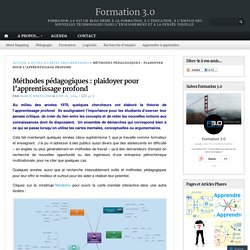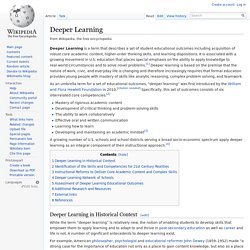

Méthodes pédagogiques : plaidoyer pour l’apprentissage profond. Au milieu des années 1970, quelques chercheurs ont élaboré la théorie de l’apprentissage profond.

Ils soulignaient l’importance pour les étudiants d’exercer leur pensée critique, de créer du lien entre les concepts et de relier les nouvelles notions aux connaissances dont ils disposaient. Un ensemble de démarches qui correspond bien à ce qui se passe lorsqu’on utilise les cartes mentales, conceptuelles ou argumentaires. Cela fait maintenant quelques années (doux euphémisme !) Deeper Learning. Deeper Learning is a term that describes a set of student educational outcomes including acquisition of robust core academic content, higher-order thinking skills, and learning dispositions.

It is associated with a growing movement in U.S. education that places special emphasis on the ability to apply knowledge to real-world circumstances and to solve novel problems.[1] Deeper learning is based on the premise that the nature of work, civic, and everyday life is changing and therefore increasingly requires that formal education provides young people with mastery of skills like analytic reasoning, complex problem solving, and teamwork. As an umbrella term for a set of educational outcomes, “deeper learning” was first introduced by the William and Flora Hewlett Foundation in 2010. [citation needed] Specifically, this set of outcomes consists of six interrelated core competencies.[2] Deeper Learning in Historical Context[edit] Deeper Learning Network of Schools[edit]
Méthodes pédagogiques : plaidoyer pour l’apprentissage profond. Student_Approaches_to_Learning.pdf.